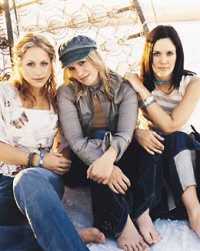(courtesy of Sparrow Records)
The essence of life is change, and time births wisdom. And so, we live our lives in front of each other, bringing front and center the important things, all for the sake of finding our place within a fast-changing world. For Sparrow Records recording artist ZOEgirl, fullness of life is everything, and the group has spent the past three years exploring, through their songwriting and music, the hard issues facing teenage girls. Culturally pervasive themes such as self-esteem, eating disorders, suicide, and teen sex have always been near to the heart of ZOEgirl, and with collective sales of nearly 1 million units on projects ZOEgirl and Life alone, it is clear that their message has struck a powerful chord with a vulnerable generation.
ZOEgirl—Chrissy Conway, Alisa Girard, and Kristin Swinford—is a group who understand the relationship between time and change, and its impact on their music and message. "With the first album, there was such a hole in the music industry that would reach the in-between age (12-16 year olds) and a lot of parents in the church were really frustrated that their daughters were buying music that they didn't approve of," Alisa explains. If they wanted to fill a void within such a rudderless industry, ZOEgirl realized that they would initially have to sacrifice some of their own artistic tendencies in order to "make it fit for these little girls that were lost in a sea of pop music." With the catchiest of pop beats and choreography, ZOEgirl made their way onto the music scene, scoring four Top 5 radio hits, and eventually appearing before more than a million people, having toured with such artists as Newsboys, Plus One, Avalon, and Carman.
With the release of their sophomore project, Life, ZOEgirl stepped outside the stylistic bounds of a more packaged debut and created a brilliant second chapter in their ministry. Life, with its edgier, more intense feel, garnered more hits and praise, and ultimately opened more doors for the message of ZOEgirl to be developed as well as shared. Suddenly, Chrissy, Alisa, and Kristin found themselves stepping deeper into the raw heart of pop culture. In 2001, the group participated in a mission trip to Caracas, Venezuela, where they ministered with 300 young girls to the community through personal interaction and music. "One night we split into teams with the idea that the girls could share anything that was on their hearts," Chrissy recalls. "We were stunned by what we heard. Things like: 'I hate my body,' 'I hate my shape,' 'I'm taking diet pills,' 'I'm thinking of suicide.' I don't think we realized that so many of the girls, almost all of them, were dealing with these issues."
The essence of life is change, and the current musical climate is schizophrenic. On any given Top 40 station, the playlist will include Eminem, POD, Pink, Avril Lavigne, and Justin Timberlake-all in a row, typically. The pressure is off; there is no particular pop genre vying for the attention of the youth. After three years of familiarizing themselves with their audience, cultural trends, and each other, ZOEgirl adamantly believe that Different Kind Of Free, the group's third studio release, is the project most true to who they are artistically, as individuals and as a group.
ZOEgirl fans should not worry about not being able to recognize their favorite group. The lyrics found on Different Kind Of Free are as personal and accessible as ever. Stylistically, the group has found a rare balance between guitar-driven pop and groove-laden R&B, while maintaining their signature sound of catchy hooks and powerful choruses.
If ZOEgirl filled a void within pop music while simultaneously bringing to light the issues facing young girls, and if Life took those issues to the next level, then Different Kind Of Free is a project dedicated to the responsibility of making sense of the issues. It is evidence of the connection between time and change, honesty and wisdom. "We believe that our role is to be honest. It's letting people know that we're not perfect; it's letting them know that we all have needs and desires to be stronger, and to follow God more. That's what our role is … being an example to follow," explains Kristin.
Although ZOEgirl is incredibly serious about exposing the pain which so much of their audience experiences, they are not content to simply let their audience remain in the broken-ness. "We want to talk about issues and empower people to be able to move past where they are and receive healing from God," Alisa explains.
Empowerment. Freedom. These are the pervasive themes on Different Kind Of Free. The title track itself feels especially timely for Alisa. "We live in a freedom-focused world. 'Life, liberty, and the pursuit of happiness.' It's all such an insecure freedom. We want to profess a kind of freedom that can't be taken away."
Though Different Kind Of Free is a stylistic evolution for the women of ZOEgirl, the group's mission remains constant: "We want to clearly lay out the story of Christ, of how to know him and receive him, because it is the most alive and passionate thing in our hearts," says Alisa.
